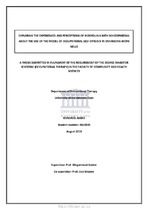| dc.contributor.advisor | Soeker, Mogammad | |
| dc.contributor.author | Abbas, Iesrafeel | |
| dc.date.accessioned | 2019-02-04T08:17:11Z | |
| dc.date.available | 2019-02-04T08:17:11Z | |
| dc.date.issued | 2018 | |
| dc.identifier.uri | http://hdl.handle.net/11394/6525 | |
| dc.description | >Magister Scientiae - MSc | en_US |
| dc.description.abstract | Globally, high unemployment rates exist amongst individuals with schizophrenia. Evidence
suggests that these individuals have a desire to return to work (RTW), however, they
experience difficulty in finding as well as sustaining employment. Work plays a pivotal role
in the functioning of individuals with schizophrenia and has a substantial positive influence
on their quality of life (QOL). Several studies recommend supported employment as a
practice aimed at improving rates of competitive employment for individuals with
schizophrenia.
The current study aimed to explore the experiences and perceptions of individuals, with a
primary diagnosis of schizophrenia, about the use of the Model of Occupational Self-Efficacy
(MOOSE) as a supported employment strategy in enhancing the work skills and facilitating
RTW in the open labour market. A qualitative research design was utilised to explore these
experiences and perceptions from nine participants. Additionally, one occupational
therapist and one occupational therapy technician were selected and participated as key
informants of the study. Participants were selected through the use of purposive sampling.
Written informed consent was received from the participants, and their confidentiality was
upheld throughout the study. Semi-structured interviews were used to collect data, and
were audiotaped and transcribed verbatim. Transcriptions were anal | en_US |
| dc.language.iso | en | en_US |
| dc.publisher | University of the Western Cape | en_US |
| dc.subject | Schizophrenia | en_US |
| dc.subject | Supported employment | en_US |
| dc.subject | Return to work | en_US |
| dc.subject | Occupational therapy | en_US |
| dc.subject | Client-centred approach | en_US |
| dc.subject | Occupational Self-Efficacy | en_US |
| dc.title | Exploring the experiences and perceptions of individuals with schizophrenia about the use of the model of occupational self-efficacy in enhancing work skills | en_US |
| dc.rights.holder | University of the Western Cape | en_US |

